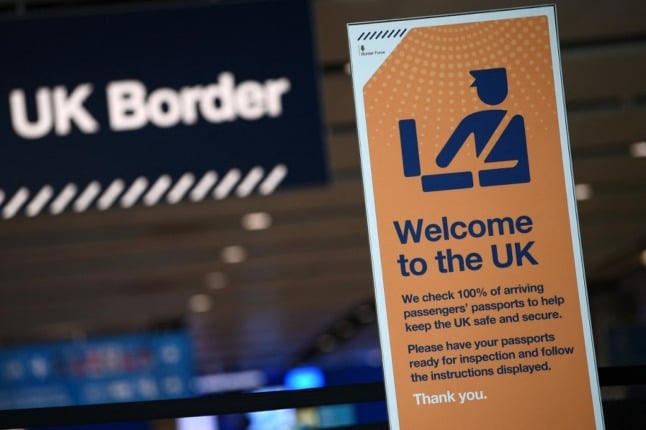From a 10-year work and residence permit to stringent income criteria, the packages of rights on offer from EU27 member states to mitigate a no-deal Brexit for resident UK nationals vary immensely from country to country.
Duration of no-deal residence permits
By far the most generous is Malta's. “The Maltese authorities will give a 10 year status to UK nationals who are resident in Malta on 29th March 2019. For a UK citizen to become a beneficiary of such status, they will have to be resident in Malta on 29th March 2019,” Sarah-Louise Galea, head of international media at the Maltese Prime Minister’s Secretariat, confirmed to The Local by email.
Students will be able to continue studying in Malta; workers “will automatically have open access to the labour market, hence eliminating the requirement for an employment licence.” Self-sufficient individuals will have to prove they have income equivalent to the Maltese minimum wage, as well as valid health insurance.
Malta's offer contrasts sharply with that of other nations. It does not matter how long UK nationals have been in Malta, as long as they are resident by March 29th or the UK's withdrawal date. There will be no fee for applications.
France, on the other hand, has various offers depending on how long UK nationals have resided there. UK nationals who have been in France for five years will be able to apply for a carte de séjour permanent. Those who have been there less than five years may have to meet income criteria, as of yet not published.
And there is talk of the fees for a carte de sejour reaching €269 albeit the British Embassy says it expects the cost to be around €150
READ ALSO: 24 days to: The new Brexit advice for Britons in France
Germany also intends to process UK nationals under third country national migration law and will offer a likely brief three month transition period to allow more time. UK nationals in the EU's largest economy have been urged to apply for new residence permits.
READ ALSO: Brexit: Brits across Germany urged to apply for residence permit
Poland will offer two options: a temporary residence permit of three years and permanent residency for UK nationals who have resided continuously in Poland for five years at the time of the withdrawal date, according to the EU Commission.
Sources at rights group British in Europe say Italy is considering the right to remain for life for those UK nationals who have residency at the time of withdrawal. Italy has not yet published details of the 'decree' it has said it will pass to protect UK nationals' rights in the event of a no-deal.
READ ALSO: The ultimate no-deal Brexit checklist for Brits in Italy
Transition periods
When it comes to rights, “the funniest thing about Europe is the little differences,” to borrow from Pulp Fiction's Vincent Vegas. These are particularly evident on the no-deal rights question when it comes to how quickly Brits will have to apply for new documents after March 29th.
Sweden has said UK nationals will have a year to apply for a new residency status in the event of a no-deal; Austria on the other hand says all Brits will have to apply within six months for new documents.
READ ALSO: How the Swedish Migration Agency is preparing for a no-deal Brexit
Spain is considering a 24-month transition period – “Spanish authorities need an enough period of time to cope with the process (sic),” states an outline by the EU Commission of the rights of UK nationals in each member state in the event of a no-deal exit.
READ ALSO: Spain to pass new law to protect rights of Britons in case of no-deal Brexit
Overview on no deal #Brexit actions for UK citizens by EU27 countries below. MS committed to use national law generously; also, many long-term UK residents will have rights under EU law. But the WA & its orderly exit is obviously a much better way forward https://t.co/DjubF6G9e4
— Stefaan De Rynck (@StefaanDeRynck) March 6, 2019
UK nationals in the German capital Berlin will likely have only three months to apply for a new residency permit. British nationals have already been asked to re-register their presence. Although Germany's transition period could be “possibly longer,” according to info from the EU Commission.
READ ALSO: What you need to know about Berlin's Brexit registering process
The Netherlands' so-called “national transition scheme” for UK nationals in the event of a no-deal proposes a 15-month transition period up until 1 July 2020. Italy's transition period is set to last between six to nine months, although details have not yet been officially confirmed. Belgium has said it will guarantee the rights of UK nationals until the end of 2020, regardless of the outcome. Portugal also envisages a transition period until the end of 2020, during which the rights of UK nationals resident before March 29th will not be altered.
Bulgaria will also give UK nationals until the end of 2020 to apply for new residence permits. Latvia has proposed a similar transition period. Lithuania is one of the only countries that will accept applications for new 'no-deal residency permits' before March 29th 2019. Luxembourg's transition period will run until the end of 2019.
Red tape v automatic documents
Some countries require Brits to actively register for new documents – France, Germany and Spain for example. Others will simply issue temporary documents by default. UK nationals resident in the Netherlands will automatically receive a temporary residence via the post in the event of a no-deal and be invited to apply for permanent residency by April 1st 2020.
Croatia, Slovenia, Cyprus and Bulgaria have said they will also offer a package of rights although all remain mirky on the details of what that will entail and how it will work.
Cost of documents
Malta has said applications will be free of charge. Other countries have said they will charge a fee. France, for example, has announced there will be a fee to get a new residence permit, although the government has not said how much it will be. And there is talk of the fees for a carte de séjour reaching €269 albeit the British Embassy says it expects the cost to be around €150
As far as we can see, Malta is the only country that is offering residence permits free of charge.
Criteria
Spain and France have said they will introduce income assessment criteria for some UK nationals to obtain a permit, which is likely to affect low-income families and pensioners most. Malta only requires “self-sufficient” UK nationals to prove they have an income equivalent to the Maltese national minimum wage – €175.84 per week for those aged over 18. This means UK nationals with an income of at least €9,000 per year will be able to meet the criteria.
“Possessing the right of residence or permanent residence under free movement rules in Poland on the withdrawal date will be the only positive condition for granting these permits,” states an EU Commission outline.
Countries like Germany and Czech Republic have said that UK nationals will have to apply as third country nationals for residence permits after the transition period, meaning Britons in those countries will be subject to more stringent income criteria and checks. Third country nationals applying for residency in Germany must prove relevant qualifications for employment, or have a job offer.
Denmark is encouraging UK nationals there to apply for a permanent residency card before March 29th, although it has said it will pass a 'no-deal' bill for UK nationals.
READ ALSO: Denmark’s no-deal Brexit bill: What British residents need to know
A no-deal Brexit would become a reality if the UK parliament does not approve the Withdrawal Agreement agreed by UK and EU negotiators in the next three weeks and if the UK and the EU cannot agree on an extension period to Article 50, which expires on March 29th.
READ MORE: No-deal Brexit: Country by country guide to how the rights of Britons will be affected



 Please whitelist us to continue reading.
Please whitelist us to continue reading.
Member comments